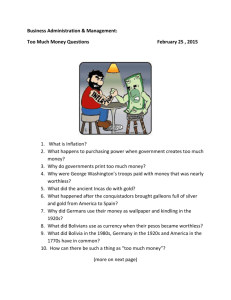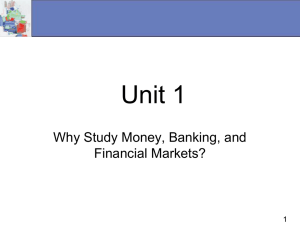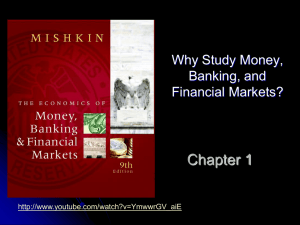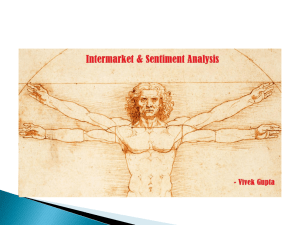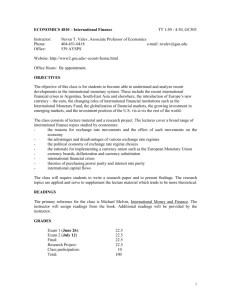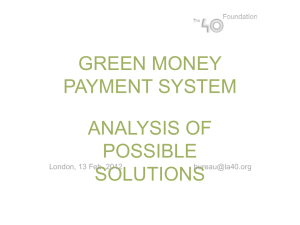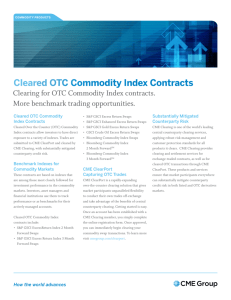End of Money and the Future of Civilization
advertisement
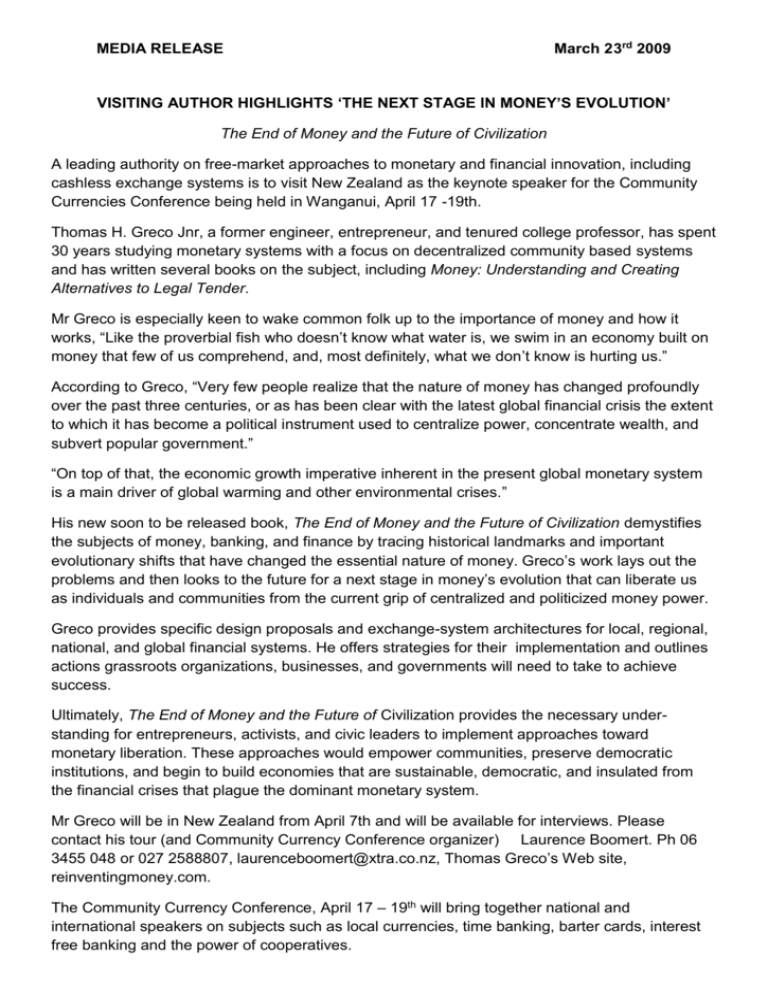
MEDIA RELEASE March 23rd 2009 VISITING AUTHOR HIGHLIGHTS ‘THE NEXT STAGE IN MONEY’S EVOLUTION’ The End of Money and the Future of Civilization A leading authority on free-market approaches to monetary and financial innovation, including cashless exchange systems is to visit New Zealand as the keynote speaker for the Community Currencies Conference being held in Wanganui, April 17 -19th. Thomas H. Greco Jnr, a former engineer, entrepreneur, and tenured college professor, has spent 30 years studying monetary systems with a focus on decentralized community based systems and has written several books on the subject, including Money: Understanding and Creating Alternatives to Legal Tender. Mr Greco is especially keen to wake common folk up to the importance of money and how it works, “Like the proverbial fish who doesn’t know what water is, we swim in an economy built on money that few of us comprehend, and, most definitely, what we don’t know is hurting us.” According to Greco, “Very few people realize that the nature of money has changed profoundly over the past three centuries, or as has been clear with the latest global financial crisis the extent to which it has become a political instrument used to centralize power, concentrate wealth, and subvert popular government.” “On top of that, the economic growth imperative inherent in the present global monetary system is a main driver of global warming and other environmental crises.” His new soon to be released book, The End of Money and the Future of Civilization demystifies the subjects of money, banking, and finance by tracing historical landmarks and important evolutionary shifts that have changed the essential nature of money. Greco’s work lays out the problems and then looks to the future for a next stage in money’s evolution that can liberate us as individuals and communities from the current grip of centralized and politicized money power. Greco provides specific design proposals and exchange-system architectures for local, regional, national, and global financial systems. He offers strategies for their implementation and outlines actions grassroots organizations, businesses, and governments will need to take to achieve success. Ultimately, The End of Money and the Future of Civilization provides the necessary understanding for entrepreneurs, activists, and civic leaders to implement approaches toward monetary liberation. These approaches would empower communities, preserve democratic institutions, and begin to build economies that are sustainable, democratic, and insulated from the financial crises that plague the dominant monetary system. Mr Greco will be in New Zealand from April 7th and will be available for interviews. Please contact his tour (and Community Currency Conference organizer) Laurence Boomert. Ph 06 3455 048 or 027 2588807, laurenceboomert@xtra.co.nz, Thomas Greco’s Web site, reinventingmoney.com. The Community Currency Conference, April 17 – 19th will bring together national and international speakers on subjects such as local currencies, time banking, barter cards, interest free banking and the power of cooperatives. Here below is a detailed table of contents Thomas H Greco Jnr’s new book, (from Chelsea Green Publishers) - expected to be in print around the middle of April. The End of Money and the Future of Civilization Contents List of Tables and Illustrations 1 My Purpose and My Journey My Personal Journey • Seeds of Disillusionment • Awakening • In the Wake of Inflation • E.C. Riegel • Why Yet Another Book? 2 Mega-Crisis and Metamorphosis—Can Civilization Be Saved? Prospects and Prognostication • Exponential Growth • Limits to Growth • Paradigm Shift • Metamorphosis • The Egg, the Caterpillar, and the Butterfly • Get With the Program 3 The Contest for Rulership—Two Opposing Philosophies Elitist or Egalitarian? • The Contest in American History: Monarchy or Republic? • Power by Other Means 4 Central Banking and the Rise of the Money Power Central Banking, an Unholy Alliance • The Bank of England • Central Banking in the United States • The First Bank of the United States • Andrew Jackson and the “Bank War” • The Free Banking Era • The Federal Reserve • Central Banking Spreads around the World 5 The New World Order The Power Behind the Central Banks • A Merging of Interests • Wars, Internal and External • Money Power, the Key Element in the New World Order • Erosion of National Sovereignty 6 Usury and the Engine of Destruction Monetary Stringency, Past and Present • Increasing Instability • The Magic of Compound Interest • What’s Wrong with the Global System of Money and Banking? • How Debt-Money is Dysfunctional • Three Aspects of Money Dysfunction • Moral Arguments, Laws, and Practical Solutions • Keys to Transcendence • Exchange and Finance—Two Distinct Credit Functions 7 The Nature and Cause of Inflation What Is Inflation? • Who Has the Power to Inflate? • Improper Basis of Issue by Banks Is Inflationary • Government Deficits and Inflation • The German Hyperinflation—A Classic Case • How the Inflation Was Ended • Constraints Upon Debasement of the Money • Responding to Inflation 8 The Separation of Money and State The Separation of Church and State—A Comparison • The Disestablishment of Monetary “Religion” • Two Meanings of “Dollar” • Delinking from the Dollar as a Payment Medium • Delinking from the Dollar as a Measure of Value • Stable Value Reckoning • Toward Freedom of Exchange 9 The Evolution of Money—From Commodity Money to Credit Money What We Don’t Know Is Hurting Us • Kinds of Economic Interaction • “The Ladder of Economic Civilization” • The First Evolutionary Step—Barter to Commodity Money • Commodity Money • Symbolic Money • The Second Evolutionary Step— From Commodity Money to Credit Money • Two Distinct Kinds of Money— Fractional Reserve Banking • Redeemability Abandoned • Checks and Checkable Deposits Displace the Use of Banknotes • Gold Versus Credit Money—A Comparison • How Credit Money Malfunctions 10 The Third Evolutionary Stage—The Emergence of Credit Clearing Banks and the Credit Clearing Process • A Confusion of Language • Particle or Wave? Thing or Relationship? • Clearing Through Banks Versus Mutual Credit Clearing • Direct Credit Clearing Makes Conventional Money and Banking Obsolete 11 Solving the Money Problem The Basis of Monetary Dysfunction • Reform or Transcendence? • Emerging Exchange Alternatives • Separating the Functions of Money • Back to Commodity Money? • The Unit of Account Versus the Unit of Currency • The Measurement of Value • Proper Relationship Between Commodities (Gold/Silver) and Credit • Confusion Caused by Legal Tender Laws 12 Credit Clearing, the “UnMoney” What Is Credit Clearing? • A Simple Example of Clearing among Banks • Settlement of Accounts • Mutual Credit Clearing Systems as Clearing Houses • Direct Credit Clearing—A Simple Illustration Using Four Accounts and Ten Transactions • Balance Limits and Settlement • Providing Surety of Contract • An Insurance Fund 13 The State of the Alternative Exchange Movement Two Currents of Alternative Exchange • The Tucson Experience • Why Exchange Alternatives Fail to Thrive • Failure of Reciprocity • Inadequate Scale and Scope of Operation 14 How Complementary Currencies Succeed or Fail Architecture of the Currency Itself • Principle 1: Who Is Qualified to Issue Currency? • Principle 2: On What Basis Should Currency Be Issued? • Principle 3: How Much Currency May Be Issued By Each Issuer? • Implementation Strategies • The Situational Context • WIR • Social Money in Argentina 15 Commercial Trade Exchanges—Their Present Limitations and Potential Future Limiting Factors • Limited Scale and Scope • The Value Proposition • Operations and Agreements • Proposed Remedies • The Real Deal—Credit Clearing Services • Tapping the Vast Potential Market • What About Taxes? • An Eventual Cashless Trading Network 16 A Regional Economic Development Plan Based on Credit Clearing Approaches to Community Economic Development • Stage I: Mapping the Territory and Import Substitution • Stage II: Mutual Credit Clearing Provides an Alternative Means of Payment • Sage III: The Credit of “Trusted Issuers” Provides an Alternative Currency for Regional Circulation • Stage IV: Support Structures for Localization—Saving, Investment, Finance, and Education • Stage V and Beyond: Transition to an Objective Measure of Value and Accounting Unit 17 The Next Big Thing in Business: A Complete Web-Based Trading Platform The Convenience of Cards • Improving the Exchange Process—Challenge and Opportunity • Significant Trends and “Disruptive Technologies” • Strengths and Vulnerabilities of Political Money and Conventional Banking • From Disruptive to Sustaining—Moving Upmarket • The Emergence of a Complete Web-Based Trading Platform • Essential Components of the Web-Based Trading Platform • Completing the Web-Based Trading Platform 18 Organizational Forms and Structures for Local Self-Determination and Complementary Exchange Toward Economic Independence • The “Banjar” and the Balinese Governance Structure • The Mondragon Cooperatives • Ways of Organizing Credit Clearing Exchanges • Corporations • Limited Liability Companies and Limited Liability Partnerships • Mutual Companies • Scale of Organization 19 The Role of Governments in Establishing Economic and Financial Stability What National Governments Should Do • Objectives • Rationale • Legislative Proposals in Brief • The Role of State, Provincial, and Local Governments • An Early Example of a Local Currency 20 Exchange, Finance, and the Store of Value The Store of Value • Saving and Investment • Liberating Saving and Investment • Debt Claims Versus Equity Claims • A Shared Equity Mortgage • Savings and Investment within Complementary Exchange Systems

